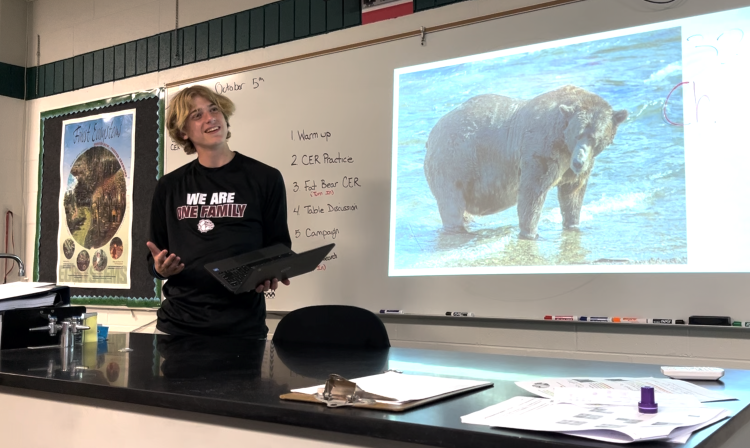Grandville — As soon as the classroom door opened for fifth-period Biology 1, the friendly trash-talking among the freshmen began:
“Chunk is who I’m voting for — he’s going to whip ‘em.”
“Nah, 402 is a specimen, bro! You’ll see.”
For those not in the know, “Chunk” and “402” were two of this year’s carnivorous competitors featured in the National Park Service’s popular “Fat Bear Week” bracket. The online tournament highlights the bears of Katmai National Park, Alaska, and the work they do to fatten up in preparation for winter hibernation.
Grandville High School teacher Meggan Weir also features the famous bears in Biology 1, but for a slightly different purpose.
“In science, we have content plus practices that we teach,” Weir said. “The goal of the lesson is to work on claim, evidence and reasoning: being able to create an oral or written argument based on evidence, and then being able to respectfully give and receive critiques about your scientific argument.”
Hence, her assignment to the freshmen: Create a scientific claim based on the following question: Which bear will win Fat Bear Week 2023?
To do so, students first picked a furry competitor to campaign for, then did extensive research on the bear to use as evidence as to why they thought it would win the competition. They studied their bear’s history, fishing habits, wilderness skills and other characteristics to put together a comprehensive argument supporting their claim.
Aly Collar said bear 128, “Grazer,” caught her eye right away.
“She’s obviously different from all the rest because she’s a lighter color, and most of the other bears are darker browns, so it’s easier to pick her out from the rest,” Aly said.
Aly said her research uncovered several pieces of evidence that made Grazer seem like a good choice: “It was documented that (Grazer) can fish pretty much anywhere, and she doesn’t take much (looking) to find where she wants to hibernate — she can do it almost anywhere,” Aly explained. “She’s pretty adaptable.”
Andrew Hondorp picked bear 164, “Bucky Dent.”
“He’s already good at eating a lot of salmon, but as he gets bigger, as he grows, that actually helps him to get more fish,” Andrew said. “Plus, he knows where to stand in the river, in the perfect spot, so he can catch (fish) right in his mouth.

“And also, he’s already grown a ton over 2023 — way more since last year — so you can only assume he’s going to get way bigger.”
As part of the scientific process, Weir gave students a chance to campaign for their bear in front of the class, to give them more practice with both public speaking and defending their scientific arguments.
“We need to practice (claims, evidence and reasoning) because (students) see it done in science, they see it in history, but it’s somewhat difficult to figure out without practicing,” Weir said. “In science and in the world, we make claims and we like to just think we know what we’re doing, but we need some practice with the evidence and reasoning.
“And fat bears are just fun.”
Read more from Grandville:
• Educators, legislators talk teacher pay, diversity
• ‘It feeds me,’ says teacher-artist










